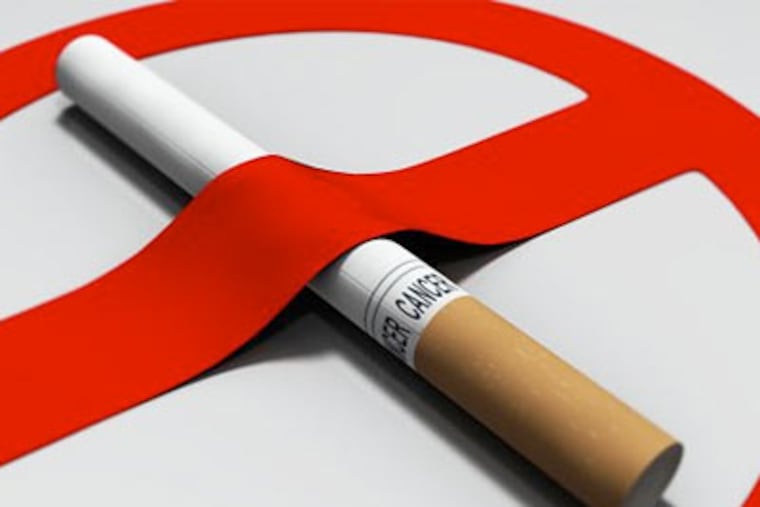
The state Senate has rejected what may be the best hope for giving the rest of Pennsylvania most of the protections from secondhand smoke enjoyed by Philadelphians. So now what?
Well, the senators should take a breather - smoke 'em if they've got 'em - then make a second attempt at approving the needed public health measure they rejected Wednesday.
To do otherwise might set back for months or longer the long-overdue efforts to put Pennsylvania in step with its neighbors. New Jersey, Delaware and New York, as well as more than two-dozen other states, have gone mostly smoke-free.
But for Philadelphia, the Keystone State for too long has been content to be the ashtray of the Northeast.
Warts and all, the compromise smoke-free bill crafted by a House-Senate committee on Tuesday would ban smoking in most workplaces and public areas across the state.
In a key victory for clean air, the proposed state law would leave alone Philadelphia's 18-month-old smoke-free ordinance. That means patrons and employees at the city's two planned casinos will be able to breathe free.
There's no getting around the fact that the bill has exemptions that, unfortunately, would leave many people exposed to the hazards of secondhand smoke. That was the price of getting the Senate committee members to approve the legislation. Even House members who were holding out for a total ban agreed to go along with the compromise by an overwhelming vote on Wednesday. Gov. Rendell also says he'll sign the bill, as a major step forward in combating the ills of smoking. So now, it's up the Senate to relent.
There's reason to hope that upstate and suburban casinos, many private clubs, residential and treatment facilities, and even corner bars exempt from the ban will embrace smokeless rules voluntarily once smoke-free becomes the norm.
Rather than the exemptions, though, a key stumbling block in the Senate Wednesday proved to be that the legislation would not allow other cities or counties to take even tougher stands against smoking. Senate Minority Leader Robert J. Mellow (D., Lackawanna) led the charge over this, producing the Senate's 31-19 defeat.
No question, Pittsburgh, Scranton and other places should be allowed to take more aggressive steps on smoking. Or the state could solve the patchwork problem by just adopting a strong bill that copies Philadelphia's successful 2006 smoke-free law.
But, as noted by the lead negotiator, Sen. Charles McIlhinney (R., Bucks), the compromise smoke-free measure was a year in the making and it might not survive if taken back to the drawing board.
It's significant that stalwart supporters of a strong smoke-free law - Sen. Stuart J. Greenleaf (R., Montgomery) and state Rep. Michael Gerber (D., Montgomery) - agreed to support McIlhinney's bill. They understand that Harrisburg policy is the art of the possible, not the perfect.
This is a perfect opportunity for the Senate to protect millions of citizens from secondhand smoke, while giving smokers yet one more reason to kick a deadly habit.